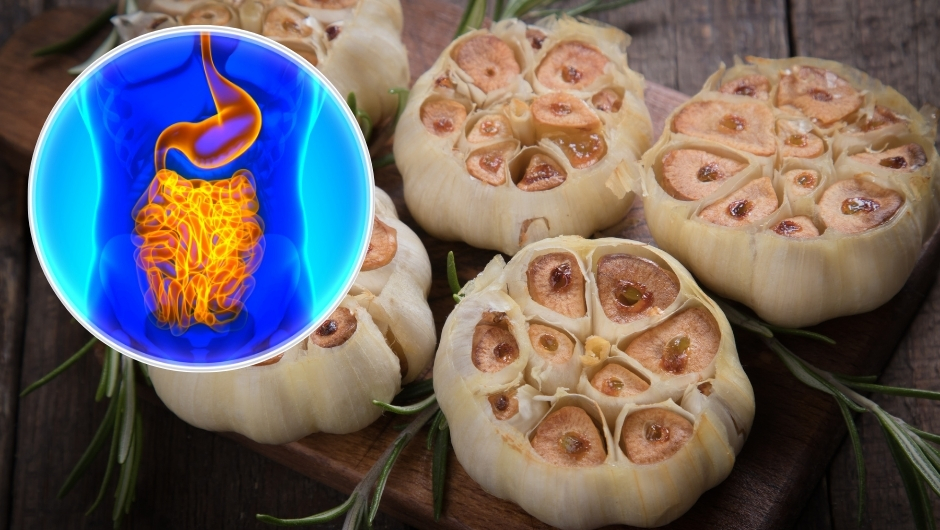Roasted Garlic: A Natural Shield for Your Gut

Garlic has been used for centuries as both food and medicine. From boosting immunity to fighting infections, it’s one of nature’s most powerful healing foods. But now, modern science is revealing another fascinating benefit—protecting the gut and reducing inflammation.
A 2022 study by Sharma et al. (Food Science and Biotechnology) tested roasted garlic on mice and found that just three weeks of intake (equal to about 60–70 g per day for a 60 kg human) led to:
- A stronger, less “leaky” gut lining
- More mucus-producing cells (goblet cells) that protect the intestine
- Reduced colon inflammation
While these results have not yet been confirmed in humans, they highlight how garlic could be a natural ally in preventing leaky gut and chronic digestive problems.
Why Garlic is Special for the Gut
1. Feeding the Good Bacteria
Garlic contains natural plant fibers like inulin and fructooligosaccharides (FOS). Unlike regular carbs, these fibers are not digested in the stomach or small intestine. Instead, they travel intact to the colon, where they act as prebiotics—food for beneficial bacteria. These fibers increase helpful microbes like:
- Bifidobacterium longum – improves digestion and supports immunity
- Lactobacillus rhamnosus – balances gut flora and protects against diarrhea
- Akkermansia muciniphila – strengthens the gut lining and improves metabolism
This shift in the microbiome can lead to better digestion, stronger immunity, and reduced inflammation.
2. Fighting Harmful Bacteria
Garlic naturally works as a broad-spectrum antimicrobial. It can suppress harmful bacteria such as:
- Clostridium difficile (linked to antibiotic-associated diarrhea)
- E. coli O157:H7 (a dangerous gut infection)
- Helicobacter pylori (linked to ulcers and stomach cancer)
What makes garlic unique is that it does not harm beneficial bacteria like Faecalibacterium prausnitzii, which plays an important role in reducing inflammation.
3. Repairing and Protecting the Gut Lining
Garlic boosts the production of short-chain fatty acids (SCFAs) such as butyrate. Butyrate is the main energy source for colonocytes—the cells that line your colon. More butyrate means:
- Faster repair of gut lining damage
- Better protection against leaky gut
- Stronger resilience to inflammation
In addition, garlic helps increase mucus production in the intestine, adding an extra protective layer against toxins and pathogens.
4. Breaking Down Biofilms
Some harmful bacteria hide behind biofilms, slimy shields that protect them from antibiotics and the immune system. Garlic’s sulfur compounds break down these biofilms, making it easier for the body to clear hidden infections.
5. Strengthening Gut Immunity
A healthy gut is not just about bacteria—it’s also about a balanced immune system. Garlic increases IgA antibodies in the gut. These antibodies coat the intestinal lining, helping to trap and neutralize harmful microbes without causing too much inflammation. This gentle immune support makes garlic especially valuable for people with chronic gut issues like IBS, IBD, or SIBO.
6. Helpful for SIBO (Small Intestinal Bacterial Overgrowth)
SIBO occurs when bacteria overgrow in the small intestine, leading to gas, bloating, and discomfort. Garlic may help by:
- Weakening harmful bacteria in the small intestine
- Reducing methane and hydrogen gas production
- Supporting the rebalance of healthy gut flora
Best Way to Use Garlic
To get the most out of garlic, how you prepare it matters:
- Crush or chop garlic and wait 10 minutes before cooking or eating. This activates its key compounds.
- Mix raw and cooked garlic. Raw garlic provides antimicrobial benefits, while cooked or roasted garlic offers prebiotic fibers that are easier on the stomach.
- Roasted garlic is gentler, sweeter, and still delivers gut-friendly effects.
The Bigger Picture
Garlic is not a magic cure, but when included regularly in the diet, it may:
- Support a healthy gut microbiome
- Protect against leaky gut
- Reduce inflammation in the colon
- Strengthen the gut lining
- Support immune balance
More human studies are needed, but the evidence so far is promising. Considering its long history in traditional medicine and modern research, garlic may truly deserve its title as a “gut healer.”